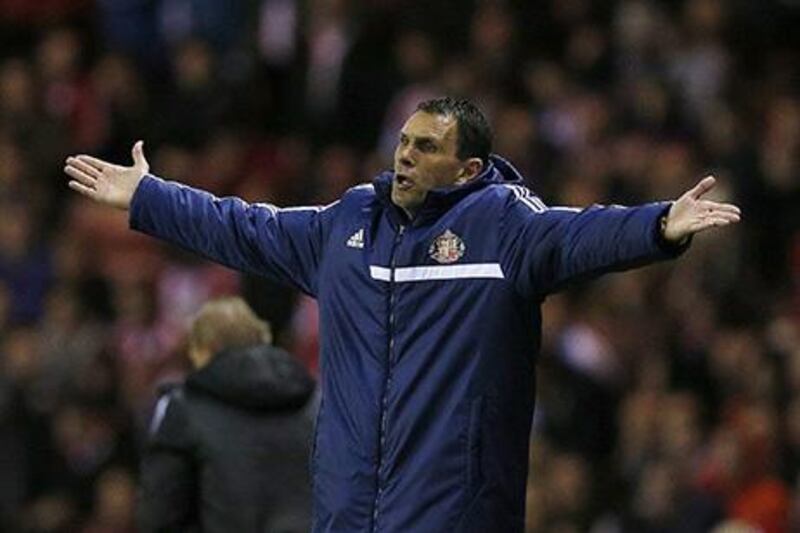“This,” the former Sunderland striker and chairman Niall Quinn said, “has been a bad season with lots of highs.”
He was right. For Sunderland, this has been a ridiculous year and although they will certainly finish behind local rivals Newcastle United, the atmosphere at their last home games said everything about how much their respective fans have experienced this season.
As Newcastle beat Cardiff City last Saturday, thousands of fans staged a 69th-minute walk-out in protest over a perceived lack of investment, banners were unveiled attacking the manager Alan Pardew and the owner Mike Ashley, and there was widespread booing.
In contrast, at the Stadium of Light on Wednesday, the atmosphere was akin to a carnival as Sunderland rounded off their amazing escape from relegation with a 2-0 win over West Bromwich Albion.
Sunderland fans enjoyed the run to the League Cup final immensely, the extra-time victory over Chelsea in the quarter-final and the farcical win in a penalty shoot-out over Manchester United in the semi-final in particular.
It was celebrated by a mass gathering at Covent Garden in London the night before the final, when red-and-white shirts filled the square and seeped down the streets leading up to it. It was a party that, for Sunderland, happens perhaps once in a generation, and yet what has happened in the past three weeks probably outstrips it.
When they lost 5-1 at Tottenham Hotspur on April 7, they were a shambles. Manager Gus Poyet will not admit it now, but it seemed then that he had given up – and understandably so. He had taken over a team that had earned one point from eight games and had not won a league match in six months, yet breathed some life into it. Nobody blamed him, but it seemed like it would not be enough.
The next game, when they lost to Everton on Wes Brown’s own goal – the seventh Sunderland had scored this season – they were seven points adrift with away games at Manchester City, Chelsea and Manchester United to come. When Poyet said Sunderland “needed a miracle”, he was not exaggerating.
But they did it. They drew at City and would have won, but for a last-minute equaliser. They won at Chelsea, inflicting the first home league defeat on Jose Mourinho at Stamford Bridge. They won at Old Trafford for the first time since 1968.
A win over Cardiff City and Wednesday’s victory made it four Premier League victories in a row for the first time since 2000. The improbability of what happened cannot be overstated.
“It will be remembered forever,” Poyet said. “Sunderland did it. It is possible. Managers will tell players in the future, even seven points adrift, you can do it.”
And memories are what fandom is made of. It may be that Sunderland’s season was actually very ordinary, just distributed strangely, with a sudden regression to the mean in the final weeks. The question becomes, what happens next?
The club owner, Ellis Short, made significant cuts to the wage bill last year – one of the reasons for the radical changes in personnel last summer – and is understood to be interested in selling the club. Poyet, having taken to the pitch after the final whistle on Wednesday to orchestrate celebrations, spoke of planning for the new season and releasing players. There are 13 who are either out of contract or whose loan deals end in the summer. He mentioned arranging a tour, though it is far from certain he will stay on next season.
Poyet’s official title is “head coach”, but he wants a more traditional manager’s role, with a greater say over transfers. Talks are planned for Monday between Poyet, Short and the club’s chief executive, Margaret Byrne.
Poyet’s star could hardly be higher with fans at the moment: he got Sunderland to a Cup final and oversaw the escape. But his January signings give cause for concern.
Marcos Alonso slotted in at left-back straightaway and Santiago Vergini eventually found a home at right-back, but both are on loan. Oscar Ustari was brought in as a back-up keeper, so his lack of pitch time is no concern.
Liam Bridcutt and Ignacio Scocco, though, both struggled. Scocco, who won the UAE league title with Al Ain in 2011/12, is gifted and may settle with a proper pre-season, while Bridcutt has shown flashes and may adapt, but neither has been a success.
Given that, it is understandable that the board should ask if Poyet is really the man to oversee transfers.
Behind the amazing escape, a more complicated game is being played out.
sports@thenational.ae
Follow our sports coverage on Twitter @SprtNationalUAE





